In a bid to enhance its artificial intelligence (AI) capabilities, Google recently unveiled a major rebrand of its AI chatbot and assistant. Formerly known as Bard, the chatbot has been renamed Gemini, aligning with the suite of AI models that power it. This move demonstrates Google’s strong commitment to investing in AI assistants, an area encompassing chatbots, coding assistants, and various productivity tools. With the release of a dedicated Android app for Gemini and integration within the Google app on iOS, Google is making it easier than ever for consumers to access this powerful AI tool.
Alphabet CEO Sundar Pichai emphasized Google’s unwavering dedication to AI during the company’s earnings call in January. He expressed his long-term vision of an AI agent capable of executing an expanding range of tasks on behalf of users, including integration within Google Search. However, Pichai acknowledged the challenges lying ahead on this journey. Other tech giants like Microsoft and Amazon have also voiced their commitment to developing AI agents as productivity tools. With the rebranding of Bard to Gemini, Google takes its first step towards the ultimate goal of building a true AI assistant.
Gemini: A New Adventure
The rollout of Gemini brings about an entirely new user experience. Android users can now enjoy the convenience of a dedicated Gemini app, while iPhone users can access the AI assistant effortlessly through the Google app on iOS. These offerings not only reflect Google’s commitment to AI but also serve as a testament to its dedication to meeting the unique needs of its diverse user base.
Unleashing the Power: Gemini Ultra 1.0
Recognizing the demand for more powerful AI models, Google introduced a new AI subscription option. Dubbed Gemini Ultra 1.0, this advanced model is available to power users willing to pay $19.99 per month through Google One, the company’s paid storage offering. Existing Google One subscribers have the added advantage of including their existing storage plans in the subscription price. To sweeten the deal, Google also offers a two-month free trial, allowing users to explore the capabilities of Gemini without any financial commitment.
Language Expansion
Although Gemini is currently limited to the English language, Google has plans to expand language support to include Japanese and Korean. Furthermore, the company aims to introduce Gemini in more languages in the future. By continuously broadening language offerings, Google ensures that an increasing number of users worldwide can leverage the power of Gemini to enhance their productivity and efficiency.
Introducing Gemini for Workspace and Google Cloud
The rebranding of Bard to Gemini also impacts Duet AI, Google’s formerly named “packaged AI agents” used within Google Workspace and Google Cloud. These customized tools serve to boost productivity and automate simple tasks for client companies such as Wayfair, GE, Spotify, and Pfizer. With the name change, these tools will now be known as Gemini for Workspace and Gemini for Google Cloud, aligning them with the broader Gemini ecosystem.
Google One subscribers with the AI subscription can now enjoy the capabilities of Gemini in various Google products. These include Gmail, Docs, Sheets, Slides, and Meet. As Google continues to enhance Gemini’s functionality, future updates aim to incorporate contextual information from users’ content in Gmail, Docs, and Drive. For instance, when responding to a lengthy email thread, Gemini will consider earlier messages within the thread and potentially relevant files in Google Drive, providing more accurate and relevant suggestions.
The Transition from Bard to Gemini
The decision to rebrand Bard as Gemini serves a specific purpose: to help users understand that they are interacting directly with the cutting-edge AI models underpinning the chatbot. As Sissie Hsiao, a vice president at Google and general manager for Google Assistant and Bard, explained, Bard was the old way to communicate with these advanced models, and now, Gemini represents the very models themselves. This intentional name change reinforces Google’s commitment to delivering innovative AI experiences.
While Gemini, along with other tools, is currently best suited for tasks such as summarization, generating to-do lists, and code assistance, the future holds vast possibilities. Google envisions AI agents capable of scheduling group hangouts, managing calendars, making travel arrangements and purchases, and performing job-specific functions, like outbound sales. With Bard, now Gemini, at the core of these advancements, users can look forward to a future driven by intelligent AI assistants capable of seamlessly assisting with various complex tasks.
Google’s rebranding of Bard to Gemini and the introduction of a dedicated Android app and iOS integration demonstrate the company’s continued investment in AI assistants. With Gemini, users gain access to an ever-evolving AI model capable of enhancing productivity and simplifying daily tasks. As language support expands, Gemini’s impact is set to extend to a global audience. With the aim of building a true AI assistant, Google is well-positioned to leverage Gemini’s capabilities and unlock a future driven by intelligent and intuitive AI technologies.


Leave a Reply